Poll: Clear Favorite for Ann Arbor Mayor
From July 28-29, several Ann Arbor residents reported being polled by telephone about their preferences in the upcoming Democratic mayoral primary election. The Chronicle has obtained the results of that poll of 435 likely voters by Public Policy Polling (PPP), a North Carolina polling firm.
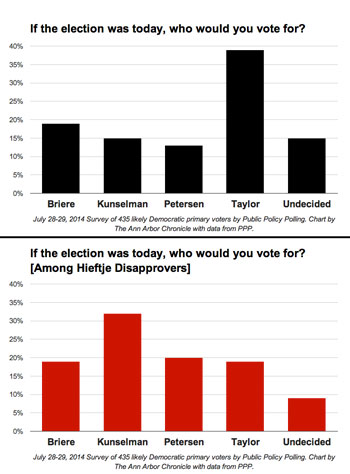
July 28-29, 2014 survey of 435 likely Democratic primary voters by Public Policy Polling. Top Chart among all voters: Christopher Taylor (39%); Sabra Briere (19%); Stephen Kunselman (15%); Sally Petersen (13%); Undecided (15%). Bottom Chart (if the election were conducted among those who disapproved of current mayor John Hieftje’s performance): Christopher Taylor (19%); Sabra Briere (19%); Stephen Kunselman (32%); Sally Petersen (20%); Undecided (9%).
They show Ward 3 councilmember Christopher Taylor to be a clear favorite, with about a week to go before the Aug. 5, 2014 primary. Taylor polled at 39% compared to 19% for Ward 1 councilmember Sabra Briere.
Ward 3 councilmember Stephen Kunselman and Ward 2 councilmember Sally Petersen polled a few points behind Briere at 15% and 13% respectively.
The poll indicates that 15% of voters still haven’t made up their minds. Margin of error for the poll is plus or minus 4.7%.
The relatively large four-candidate field is attributable to the fact that no incumbent is in the race.
Kunselman was the first of the four candidates to declare his candidacy – before mayor John Hieftje announced last year he would not be seeking reelection to an eighth two-year term.
The PPP poll also asked respondents if they approved of the job that Hieftje was doing as mayor.
One of the patterns revealed in the analysis of the poll responses is that Kunselman would be a 12-point favorite if the election were held just among those voters who disapproved of Hieftje’s performance. But the poll indicated that only 27% of Ann Arbor voters disapproved of Hieftje’s performance.
A polling question that asked about favorable or unfavorable opinions of candidates – independently of an inclination to vote for them – showed Kunselman polling with the highest unfavorable opinion numbers, at 36%. But the “not sure” category for that question polled fairly high across all candidates, ranging from 29% to 43%.
The poll also included two questions about future growth – one about downtown development, and the other about the need for an improved train station. The poll indicated 46% support for the downtown projects that have been approved and built in recent years and 39% opposition. The need for a new train station polled at 52%, while the alternate view – that the current station is adequate – polled at 35%.
The content of the poll – which evinces some knowledge by its creator of the Ann Arbor political landscape – was not commissioned by The Chronicle or by any of the four mayoral campaigns. Tom Jensen grew up in Ann Arbor and is now director at Public Policy Polling, a firm based in Raleigh, North Carolina. But Jensen still follows Ann Arbor politics. It was Jensen who put the poll together – out of his own interest. And it was Jensen’s voice that was used in the interactive voice response (IVR) technology deployment of the Ann Arbor mayoral poll.
The poll drew as a sample all those who’d participated in any primary election (Democratic or Republican) since 2006. Poll respondents included 32% Republican or other non-Democratic affiliation.
In a telephone interview, Jensen stressed that any poll result should be viewed with a lot of caution, especially with local elections. “I would definitely, as a pollster, encourage people to take caution in over-interpreting one poll of a low-turnout race in the middle of the summer. You’re definitely prone to more error.”
But based on the results of this poll, he said he was 99% confident that Taylor was going to be the next mayor of Ann Arbor.
Additional charts and some additional background on the polling methodology are presented below.
Analysis: Hieftje as Frame
At the Ann Arbor Democratic Party primary forum for mayoral candidates held on June 14, 2014, Stephen Kunselman sought to distinguish himself from the other three candidates – by saying that he’d represent the working class, stressing that he’s the only candidate with policies and politics that differ from the current mayor, John Hieftje, and from Hieftje’s supporters. “I’m offering you a choice of someone that is not in that camp,” he said.
Hieftje appears to be a popular mayor – judged by outcomes of elections over more than a decade that have not seen Hieftje ever lose a precinct. And that popularity is supported by the PPP poll, which gives Hieftje 52% approval against 27% disapproval and 21% not sure:
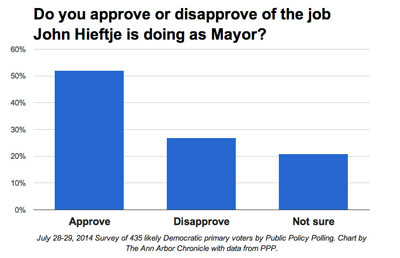
Chart 1: July 28-29, 2014 survey of 435 likely Democratic primary voters by Public Policy Polling. 52% of Ann Arbor voters approve of mayor John Hieftje’s performance, 27% disapprove, and 21% are unsure about his performance.
The logical premises of campaigning against a sitting popular mayor – who is not running for reelection – hinge on the fact that this year’s primary is a four-way race: If Kunselman were to dominate among voters who are dissatisfied with Hieftje, and the other three candidates were to enjoy roughly uniform shares of support from voters who are satisfied with Hieftje, that combination could conceivably give Kunselman more votes than the other three candidates.
While Kunselman is the clear favorite among voters who are dissatisfied with Hieftje, Kunselman still polls at just 32% in that group. [See red bars in Chart 2 below.]
The second logical premise also does not appear to be supported by the polling data. The other three candidates do not roughly split the support of voters who approve of Hieftje’s performance. Instead, Taylor is clearly dominant in that category, achieving a majority of support at 56%, with only Briere doing better than single digits. [See green bars in Chart 2 below.]
Among those who aren’t sure whether they approve or disapprove of Hieftje’s performance, the split is more uniform – the kind of distribution that would be needed among those who approve of Hieftje’s performance, to give Kunselman a win. [See gray bars in Chart 2 below.]
Who Are These People?
Kunselman’s campaign has also relied heavily on asking Ann Arborites to vote for him, the person. The PPP poll indicates that of the four candidates, Kunselman polls highest for those that have an unfavorable opinion of him – at 36% compared to 26% who have a favorable opinion. But even more voters (38%) aren’t sure of their opinion of Kunselman.
The same uncertainty applies to Briere, although more voters (40%) have a favorable opinion of her. Even more voters are unsure of their opinion of Petersen (43%) – who was first elected to city council two years ago. All the other candidates have at least six years of council service. Taylor’s favorable opinion numbers track closely with Hieftje’s approval numbers: 52% of voters have a favorable opinion of Taylor; and 52% of voters approve of the job Hieftje is doing as mayor.
Other Demographics
When the data is cut in other ways, Taylor’s strength, according to the PPP poll, is still apparent, although some exceptions emerge.
In Ward 3 and neighboring Ward 4, Taylor polls stronger than he does citywide, doing better than 50% in those two wards. But in her home Ward 1, Briere hits 42% compared with 31% for Taylor. And in Petersen’s home Ward 2, the poll indicates 29% support for Petersen, compared with 24% for Taylor. The undecided vote in Ward 5 is high – at 21%. Polling data cut across wards is presented in Chart 4 below:
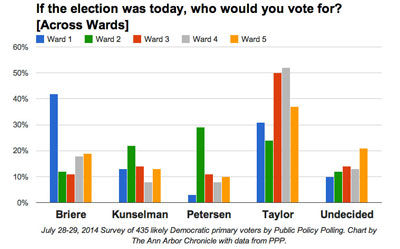
Chart 4: By Ward. July 28-29, 2014 survey of 435 likely Democratic primary voters by Public Policy Polling.
Among African-Americans, the poll shows Briere to be the strongest candidate, with 24% support compared to 21% for Taylor. Petersen’s 27% comes close to Taylor’s 32% in the “other” category for ethnicity. Polling data cut across ethnicity is presented in Chart 5 below:
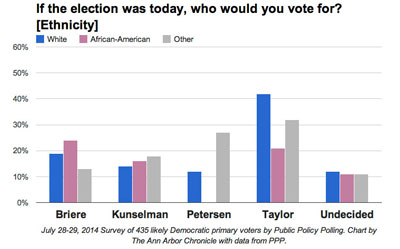
Chart 5: By Ethnicity. July 28-29, 2014 survey of 435 likely Democratic primary voters by Public Policy Polling.
Across age, one result that emerges from the poll is that Briere appears to enjoy more support among the youngest voters than she does among the oldest voters. Taylor shows a similar pattern. Kunselman and Petersen are both stronger among the oldest voters than they are among the two categories of younger voters. Polling data cut across age is presented in Chart 6 below:
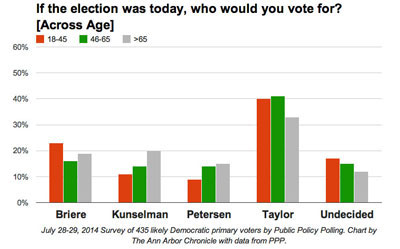
Chart 6: By Age. July 28-29, 2014 survey of 435 likely Democratic primary voters by Public Policy Polling.
With many Republicans expected to cross over and vote in the Democratic primary, the polling sample was selected from previous primary voters without regard to which primary they’d participated in – dating back to 2006. A large number of Republican and independent voters are still undecided – 27% and 26%, respectively. But Petersen is the strongest candidate among Republican voters, polling at 27%.
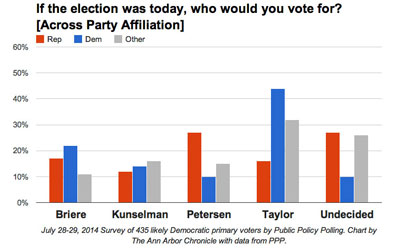
Chart 7: By Party Affiliation. July 28-29, 2014 survey of 435 likely Democratic primary voters by Public Policy Polling.
Candidates don’t show any striking differences across gender lines. Polling data cut across gender is presented in Chart 8 below:
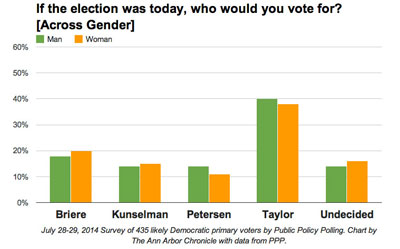
Chart 8: By Gender. July 28-29, 2014 survey of 435 likely Democratic primary voters by Public Policy Polling.
Future of Ann Arbor
The poll indicates more support than opposition to recent downtown developments that have been approved and constructed – 46% to 39%. The poll also indicates that a slim majority of Ann Arbor voters (52%) think the city needs a new train station, while 35% think the current station is adequate.
About the Poll
In the last few days, The Chronicle noticed reports on Twitter of telephone polling for the Ann Arbor Democratic primary mayoral race – citing Public Policy Polling as the polling organization. An inquiry with PPP, located in Raleigh, North Carolina, revealed that it had not been commissioned by any of the four campaigns. Responsible for the poll was PPP itself – in the form of director Tom Jensen.
Jenson spoke with The Chronicle by phone on July 29. Why did he design and implement this poll? Jenson explained: “I’m an Ann Arbor native. And even though I haven’t lived in Ann Arbor for 12 years now, I’m still really interested in Ann Arbor politics. Electing a new mayor for the first time in 14 years … I guess my curiosity killed me and I just decided to do a poll about it.”
Jensen said that he grew up in Burns Park, attended Burns Park Elementary, then Tappan Middle School, then Pioneer High School. He hasn’t lived in Ann Arbor since moving away to North Carolina to attend college.
“Since I was seven or eight years old following Ann Arbor politics, I can’t think of us ever having a truly contested mayoral primary, so there is no precedent for this.”
PPP uses an automated phone polling technique – with pre-recorded questions delivered to the respondents, who press numbers on their phone corresponding to choices. For this survey, Jensen recorded the questions himself. Readers who’d like to hear Jensen’s voice can listen to an extended interview about 2012 election results hosted on the Ann Arbor District Library website.
The survey started with the basic voting question, followed by the question about attitudes toward mayor John Hieftje’s job performance. At that point the demographic questions were asked. Respondents who answered at least the demographic questions had their responses counted for the mayoral voting poll. Additional questions came after the set of demographic items.
Asked if PPP tracks how many people hang up the phone without responding to the poll, Jensen explained that the positive response rate for polls in general these days is below 10%. The Ann Arbor mayoral primary poll had a roughly 5% response rate. Jensen attributed the general trend to flagging attention spans. A generation ago, he said, 40% of people who were called would answer the poll questions.
Jensen explained that the polling technique does account for the possibility of variable response rates across different groups of voters. So it’s always important to make sure that you have an appropriate gender, racial and age balance in the poll. Jensen said he also looked at what percentage of the vote came from each ward in the last three mayoral primaries – to make the poll response numbers were lining up in that. He concluded: “Even though the response rate was very low, I think it’s a pretty good representation of the Ann Arbor electorate.”
But he allowed that the more local a race gets, the less accurate the polling is. And that’s not something that is specific to PPP – it’s just something that is true across the board. He attributed that to the fact that it’s harder to model the electorate for smaller elections. It’s hard to say who is actually going to vote in a local election, he said. And because of that he’d cast a wide net for the polling sample. The poll had called anyone who’d voted in at least one primary since 2006.
But it’s possible that people might come out to vote who had never voted in a municipal primary before – and that can have an impact on the results, Jensen said. It’s also possible that the screening for the sample was too lenient – and that perhaps only people who had voted two or three times in a primary should have been called.
So he offered the results with a caveat: “I would definitely, as a pollster, encourage people to take caution in over-interpreting one poll of a low-turnout race in the middle of the summer. You’re definitely prone to more error.”
Still, Jensen ventured: “I am 99% confident that Taylor is going to be the next mayor of Ann Arbor – but I do think it’s good for people to always take poll results with a certain amount of caution, and not just 100% assume that every poll you see is right on the mark.”
The Chronicle could not survive without regular voluntary subscriptions to support our coverage of public bodies like the Ann Arbor city council. We sit on the hard bench so that you don’t have to. Click this link for details: Subscribe to The Chronicle. And if you’re already supporting us, please encourage your friends, neighbors and colleagues to help support The Chronicle, too!




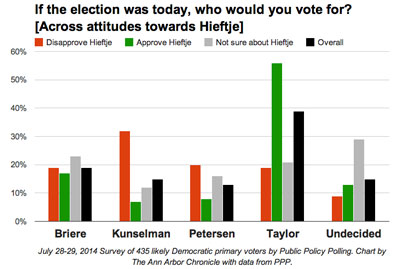
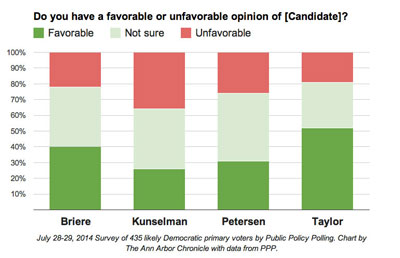
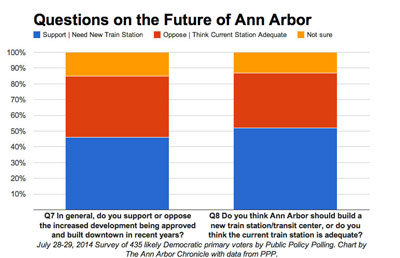
Wow – way to be a cog in the Taylor marketing machine. Usually the efficacy of marketing ploys like this fade when exposed, but in this case I am not so sure it matters. When PPP says we are going to get the best mayor money can buy, they are probably right, unfortunately.
Thank you for sharing this. Having been polled, I wondered both about who was conducting the poll and what the results were.
I hope the seemingly overwhelming margin does not dissuade anyone from voting. As Jensen said: “I would definitely, as a pollster, encourage people to take caution in over-interpreting one poll of a low-turnout race in the middle of the summer. You’re definitely prone to more error.”
Re: [1] There is no merit to that allegation, which I believe the article makes clear in the way it lays out the origin of the poll.
#2 – agree
#3 – That you believe that is what makes it a success.
I am so happy I tweeted now! Thank you very much, Dave.
The sheer number of people who would need to be involved in the conspiracy you’re alleging, Jeff, would be staggering and strain credulity. The better interpretation seems to be that a candidate knocking on doors and talking to voters about his platform might lead them to vote for him.
No candidate has a majority, and it seems that the race is still open.
Plainly, Taylor has a lead. But if a candidate campaigns among “swing” voters who may still be convinced to vote, that lead may not be there on Election Day.
#7? What are you talking about? It would only take two people -someone to ask the pollster to conduct a poll, and the pollster to act and seek to have it published. I am not questioning the results of the poll, merely the fact that it was conducted, then published as news. The fact that Taylor may be elected mayor merely points out just how many “dim bulb constituents” (to paraphrase Mr. Taylor’s own language) actually exist in Ann Arbor.
To Cahill’s point, what this article actually provides is a roadmap of useful campaign strategy for the other three candidates besides Taylor, who may not have had the resources to do their own polling. It levels the playing field.
If I were managing any of the other campaigns, I would say the first task (if you want to prove the poll wrong as a predictor) is to tackle what Jensen says could lead to polling error – miscalculating who’s going to participate in the election.
First, each candidate should focus not just on some generic clarion call to “get out the vote” but rather on getting out the vote in those categories where they are strongest. The demographic cuts of data in the article provide a way for candidates to target limited resources. If I were Sally Petersen, for example, I would spent part of my time in the waning days of the campaign calling Republicans and asking them to get out the Republican vote for the Democratic mayoral primary. If I were Sabra Briere, I’d focus on getting Ward 1 voters to turn out as strong as possible, and leave Ward 3 alone. Or if Briere is contacting voters in Ward 3 at all, then it should be new voters – perhaps those that are going to the polls for the first time to vote for Samuel McMullen. If I were Kunselman, I’d be contacting older voters or those who’ve contributed to any campaign against Hieftje in the past.
Second, the large number of undecided voters represent potential votes. So the last-days message – even if it’s sent to everyone – should acknowledge the ambivalence that many voters have. If you’re making robocalls or using phone banks or dropping lit, the script shouldn’t just start with something about “Here’s why [Candidate A] would be great for Ann Arbor.” It should start by saying: “Many voters are having a tough time making up their minds about who to vote for in the mayor’s race. Here’s one reason to vote for Candidate A.”
“Asked if PPP tracks how many people hang up the phone without responding to the poll, Jensen explained that the positive response rate for polls in general these days is below 10%. The Ann Arbor mayoral primary poll had a roughly 5% response rate”
5% response rate means…95% of the people called refused to weigh in?
Re: “5% response rate means…95% of the people called refused to weigh in?” Yes.
Re #10 – These are excellent ideas, Dave! Definite food for thought.
People should bear in mind that Taylor did not even break 40%.
What I’m talking about is you alleging that an independent poll, conducted by PPP, is part of the “Taylor marketing machine.” If you believe that PPP works for the Christopher Taylor campaign, I’ll merely ask what color the sky is in your world.
If, however, an independent poll reveals that a significant plurality of city voters prefer one candidate, how does accurately reporting the findings of that poll amount to being a cog in the leading candidate’s marketing machine?
Does that mean that 95% didn’t even pick up the phone, or of those who did pick up the phone, 95% bailed?
My caller ID showed a 1, saying the caller could not be identified. I picked up anyway in hopes of hearing the IRS scammers mentioned on MLive for myself, and heard it was a political poll. I suspected a push poll of some sort from some of the usual suspects but it was a straight up opinion poll as described in the article, so I didn’t even lie to them about my demography. At the end, they identified themselves as PPP, which I’ve heard of, and was a bit surprised (I mean, Quinnepiac has called before but for a presidential race) and so I tweeted.
Lots of things to say:
First, in my informal poll of neighborhood signs I would have given Taylor the nod. Sometimes, who you want to be the frontrunner is not always the frontrunner.
Second, while this poll has a really low response rate, this only matters if those who do not respond differ from those that do. Admittedly, often there is selective non-response, but you can’t assume it.
Frankly, in a primary with a really low voter turnout, it isn’t clear that these poll responders are going to be much different than voters.
Polling for local races is really hard to do. It is even hard to do for any primary because the wild card is who is going to show up. Remember the 2014 Virginia Republican primary?
HD is absolutely right about what the candidates should do with this information:
Taylor: We have the lead, but there are lots of undecided voters. We need to get out the vote among our followers.
Peterson: A lot of folks suspect she’s a Republican anyway, but she should appeal to those who want to have a voice in the election. The Democratic primary winner is the mayor as there isn’t a strong independent running. This is how Thad Cochran won his run-off in the 2014 Mississippi primary. He appealed to Democrats who had not voted in their primary.
Student Votes: I’d advertise in the Michigan Daily and say:
Why are Mayoral Primaries held in August?
So the student vote doesn’t count. Vote for xxxxx
Finally, turnout really matters. Clinton was completely blown away in the Iowa caucuses because of the huge turnout Obama got (in 2008). Any one of these candidates can surprise us if they get 75 people from their church, synagogue, place of work, friends of their child, etc. to show up that normally wouldn’t vote.
I know A2 loves “dem” candidates but after this upcoming primary election the winning donkey will not be running unopposed. Why no mention of Independent mayoral candidate Bryan Kelly?
Fascinating. I wish they could have included council races (thought I realize that those would be incredibly difficult to poll give the low turnouts and small sample of available voters).
While the Kunselman/Briere/Petersen clump are pretty bunched up I was surprised to see Petersen last. Based on yard signs at least I would expected she had more support. I think that Dave’s comment is right that she should focus on getting Republicans to vote in the primary though I doubt that would be enough to win it might get her to 2nd.
We could try to tease out more from voters as to their reasons for approving of Hieftje’s performance relative to that survey question. Was it his part in downsizing city staff, for example? But that’s all secondary to the bigger picture.
From a Socionomics perspective, Taylor is the obvious preference, given that Hieftje (on whose coattails he’s riding) presided through the top of the biggest economic bubble(s) in history–14+ years of it (the intervening tech stock and housing market troughs notwithstanding.) The next mayor (or two) will be the Herbert Hoover of the local level, not benefiting from what has been widely, though erroneously, regarded as a positive economic trend, but rather taking the blame for circumstances largely beyond their control.
Incomes are down, debt levels are up, property values are dropping again, interest rates are poised to shoot up, and financial markets are declining. The “Future of Ann Arbor” won’t be about train stations and new construction but about vacancies and foreclosures and debt servicing in an environment of lower and lower property tax revenues. Crime will increase, and whatever number of additional police officers hired will be offset by even more layoffs among other city staff.
The opportunity, of course, is that prices will be dropping, and local governments (especially if they lock in current low rates on debt servicing and avoid most financial investment vehicles) can take advantage of that for affordable housing efforts, renewable energy generation transition, and maybe even land purchases. (The flip side of that last one is that the profitable window for land sales will close relatively soon.)
Do any of the candidates see what’s coming? From their campaign statements it doesn’t seem so. I’ll gladly stand corrected by any of them (council candidates as well).
This is one of the few years that Republicans can vote and not be disenfranchised by our partisan system. There are no Republican choices to be made on the primary section of the ballot, so Republican voters can actually participate in local elections without spoiling the ballot. This could very well have an effect on the results, which would not be reflected in the polls. Republicans, who make up about 1/3 of Washtenaw County’s registered voters, are not likely to be on the list of primary voters called, since so much has been done to maintain the Democratic bias via partisan elections, they would not normally be voting in primary elections. Ann Arbor and Ypsilanti are the only two cities in the state who still cling to this outdated partisan system. I would not expect a change to that anytime soon, if this poll is accurate.
to #17: I suspect “Independent mayoral candidate Bryan Kelly” was not mentioned because the poll was focused on the democratic mayoral primary. Obviously, Bryan Kelly isn’t part of that.
What I want to know is what the polling showed for the A2school / Whitmore Lake consolidation question. I heard one or two mentions of the joint board meeting, but other than a Whitmore Lake resident telling me about the vote, I know absolutely zero about that topic so was unwilling to voice a preference. Maybe PPP didn’t get useful data on that question?
TJ, are you saying that you received a call that asked about the AAPS Whitmore Lake consolidation question? If so, that must have been a different poll than the one that we obtained from PPP and reported here.
It was nice of Dave to write about this, and it was nice of Jensen to run the poll. I think all the candidates can learn something from it and figure out where they are weak/strong.
They also asked about the consolidation, but it was just one question and I also informed them I was undecided.
Jeff, check out the percentage Obama got in Ann Arbor City in 2012. That’s the best measure of the partisan split in AA.
You’ll find an overwhelming majority voted Dem. There is no Republican vote worth considering. The claim that there is a large number of Republican voters that may “cross over” – when such folks are a tiny minority – is the only reason I question the general validity of this poll.
David, you are right that Obama got an overwhelming majority in 2012 (just shy of 80 percent). That said, 20 percent would put a candidate right around 2nd place in this poll. I also suspect that there are a few Milliken Republicans in town who vote Democratic now in national election as their party has abandoned them but who would vote for the Ann Arbor equivalent (historically Sheldon and Jernigan) if that candidate existed. It may be that the GOP has moved so far to the right that those candidates don’t exist even here.
#26 you are so right. National and local politics are completely different and national party affiliation is irrelevant in local elections.
A single municipal election in November would make sense for Ann Arbor. Here’s a modest proposal:
1. All qualified candidates appear on the November ballot;
2. Candidates are allowed but not required to list a party affiliation;
3. Parties are allowed but not required to endorse candidates;
4. Most importantly: voters indicate their choices in ranked order. Candidates who receive majorities win. If no candidate gets the majority, bottom-polling candidates are eliminated and their second-choice votes are distributed to remaining contenders. This procedure continues until one candidate attains a majority.
Why this matters:
1. Republicans don’t need to choose between voting in statewide primaries and municipal elections;
2. Elections are held when turnout is likely to be the highest;
3. With the Democratic Party primary the only meaningful one for municipal affairs, parties have lost their vetting rationale which is the principal function of primary elections.
Before the poll came out someone I know well made a cynical comment that I should have our bank hire the Hooper Hathaway Law Firm to do some legal work for the bank since it seemed to her that CM Christopher Taylor would probably win. If some are thinking this way, how many other business people in Ann Arbor?
One of the biggest problems in this town that I see is the culture in City Hall that permits and by inaction even encourages serious conflicts of interest. Despite years of discussion, the city council has not adopted a rule against conflicts of interest and members of city council, such as CM Christopher Taylor, who sits on the Council Rules Committee, and Mayor Hieftje routinely vote on matters where they have a financial interest that benefits the employers of their spouse and/or their business partners and/or their own employers.
I cannot consider voting for Christopher Taylor for Mayor for two reasons:
1. He is a partner is a large local law firm, Hopper Hathaway. If he is Mayor, would a business person who wanted something from the city have an added incentive to hire his firm to represent it in front of the city? As Mayor would he vote on matters where his law firm is representing clients? If a business hired a partner in a law firm, as a partner in the firm when the year-end distributions of profit are made to the partners, in the law firms I am familiar with each partner’s bonus would be directly impacted by the billings generated by the other partners, since the annual profits are divided equally among all the partners of those law firms.
2. CM Taylor also has a second conflict of interest, his wife works for the U-M, and his household revenue is directly impacted by her paychecks from the U-M. Would he not care if his wife loses her job? Therefore when he votes on matters involving the U-M, he is conflicted, yet he votes in ways that benefits the U-M, such as with his vote on the Edwards Brothers site, where the city council voted 6-5 against with CM Taylor casting a vote against exercising a valuable right of first refusal despite having a solid offer in hand to buy and develop the property from a very wealthy regional developer. This cost the city millions of dollars per year in future tax revenue, revenue that could have gone towards fixing our disastrous roads, for example. Was his decision truly on the merits or because it was in the best interest of his wife’s employer? We will never know, however he should never have participated in the discussion on this major issue, and should not have cast a vote. I do not believe that we should have a Mayor who is employed by the U-M (as is Mayor Hieftje who also cast a vote against exercising that right of first refusal) or whose spouse is employed by the U-M (as is Mayor Hieftje’s) making decisions that directly financially benefit U-M. While they are frequently in synch, the city’s long term best interest is not always directly aligned with U-M and we need a Mayor with some independence.
If CM Taylor announced that he would recuse himself from all discussions and votes involving the Clients of the Hooper Hathaway Law Firm involving the City of Ann Arbor and U-M, I would consider his candidacy on the merits, however unless he does that and the Hooper Hathaway Law Firm announces that they will not represent clients in front of the City of Ann Arbor or accept legal work from U-M, I cannot even consider voting for him. I urge him to take this opportunity now to make such an announcement to lay this issue to rest once and for all.
I am not asking him to do something I would not do myself. When some were speculating whether or not I would run for Mayor this year, I was asked a similar question, and I publicly committed in a post in The Ann Arbor News that if someday I ran for Mayor, the bank where I am CEO and which does no business now with the City of Ann Arbor, would continue not to do any business with the City of Ann Arbor, and that I would recuse myself from any discussions and any votes involving any customers of our bank.
I think it is appalling that despite the obvious major conflicts of interest present on City Council over the years, and despite promises during election years to act, the City Council fails to act to enact a rigorous conflict of interest policy governing the members of City Council and the Mayor. I believe that direct citizen action may now be required on this point and that a citizen initiative to amend the city charter to add a conflict of interest policy through a vote of the citizens in a ballot initiative is required. If you would like to work on such a ballot initiative with me, please contact me at ranzini@university-bank.com.
Jonathan,
Another benefit to your proposal is that students would be more likely to vote. I realize that not everyone would think that’s a good thing but I would argue that their participation should be encouraged for these reasons among others:
1. They make up a significant portion of the population — 1/4 or so is my understanding. Disenfranchising them means a large portion of the population has no voice.
2. Though few own property they pay property taxes, indirectly, though their rent probably at a higher (non-homestead) rate than homeowners.
3. The view that they are all here for a few years with no intention of staying is true for some but not all. I can think of a number people off the top of my head (including one mayoral candidate) who came here decades ago for school and are still here.
Jonathan and PeteM,
Chuck Warpehoski (Ward 5) has floated the idea of a charter amendment to implement some variant of a blanket primary, which would retain partisan labels on the ballot, but would allow all voters to cast ballots for any candidate for a particular local office, without regard to party affiliation. Recall that currently if you vote in the Republican primary – for, say, state rep – then you can’t vote in any of the Democratic races.
The top two vote getters – regardless of party affiliation – would advance to the November election. Warpehoski indicated at the July 7, 2014 council meeting that he might have a proposal ready for this year, but then announced at the July 21, 2014 meeting that it was not yet ripe for consideration. As I understand some U.S. Supreme Court rulings over the last 10 years, such a primary needs to include language on the ballot making clear that the candidates who appear on the general election ballot – with party labels – are not the nominees of that party that resulted from a partisan primary.
The blanket approach neatly sidesteps the politically fraught issue of partisan labels on the ballot – by keeping them. But it has all the advantages of a non-partisan primary. If the only qualified candidates for the primary were two Democrats, then the primary wouldn’t need to be run – both would advance to the general election. (Likewise for two Republicans, or for one Democrat and one Republican.) But if there were a three-Democrat field as in Ward 3 this year, instead of selecting one as the Democratic nominee for the general election, the top two would advance, and both would have a D next to their names on the ballot.
It also has the advantage that voters wouldn’t be confronted with the additional complexity of having to rank candidates, as opposed to just picking their one preferred candidate.
So…my call came to our landline. Were landlines calls used exclusively? Were cell phone numbers? How did this break out exactly? Not mentioned in the article.
Re: “…the city council has not adopted a rule against conflicts of interest and members of city council, such as CM Christopher Taylor, who sits on the Council Rules Committee,…”
The rules committee consists of Hieftje, Briere, Petersen, Warpehoski and Taylor. Warpehoski and Taylor were absent from yesterday’s (July 30) 4 p.m. meeting. The committee is currently supposed to be working on an overhaul to the council rules that might address some of the issues of conflict that Ranzini has identified.
It was, somewhat weirdly, city attorney Stephen Postema who appeared to preside over the very brief, apparently agenda-less July 30 meeting, despite the fact that Hieftje is the committee’s nominal chair. The only chair-like words that Hieftje spoke during the meeting were, “We’re adjourned!” forgetting to provide time for public comment. Otherwise, it was Postema who observed that the committee had achieved a quorum and started the meeting, briefed the members on the fact that he’s still working on a draft of new rules, articulated what his goals are for a timetable for the council to adopt the new rules, entertained discussion from committee members, and declared the meeting recessed while Petersen took an urgent phone call. Postema hopes that the council will adopt the new rules before the new council is seated in November.
So if citizens want to have an impact on how council behavior is regulated – whether at meetings or with respect to their interactions with the public and staff outside of meetings – then it looks like Stephen Postema is the person they should talk to now. The council rules committee is right now sitting passively, deferring to Postema as the architect of the rules revisions.
I think that one effect of having an attorney as mayor is that the actual seat of power in Ann Arbor’s city hall will remain solidly where it has been for at least a decade – in the city attorney’s office. While it’s worth acknowledging that some residents might see this as a good thing, for my part, it is not.
Alan, there is a relatively new federal statute that forbids robocalls (including polls like this) from being sent to cell phones. If a surveying firm wants to include cell phones, those numbers must be dialed by hand.
My guess is that this poll, which was not paid for by any candidate, did not include cell phones.
David, if this is true, then the poll numbers are skewed yet again to an unrepresentative pool of responders. 100% calls, 95% non-response rate and the 5% who did are from a subset that national polling companies have found of little value (landline users only). Of course, a reputable polling company would have known this and reported it with the rest of their data. Of course, to our local print journalists, it gets reportered in the same way a press release would–without questioning.
Here’s the methodology that PPP uses (from its website): [link]
Can’t say for sure that’s what they did this time around, but if it is, it is likely to be based on landlines only as most cell phones are not listed.
Surprising to most is that 40% of households are cell-only households: [link]
Re (33) You said: “I think that one effect of having an attorney as mayor is that the actual seat of power in Ann Arbor’s city hall will remain solidly where it has been for at least a decade – in the city attorney’s office.”
Wow! The thinking behind that statement deserves an entire column of its own. Perhaps we can get you to explore that idea sometime between the primary election and the general election.
Re: “Perhaps we can get you to explore that idea sometime between the primary election and the general election.”
Why wait? Yesterday, the rules committee abdicated its own responsibility to the city attorney, allowing him to preside over the committee meeting. That’s a specific example of the real seat of power belonging to the city attorney’s office – with the council’s willing and enthusiastic participation.
Today, I received an email from city administrator, and DDA board member, Steve Powers indicating that “The City Attorney advises that City Council approval of the raise for the DDA Executive Director is not required. City Council has approved a salary and job classification plan for non-union positions, including the DDA Executive Director. The DDA Executive Director’s current salary is within the salary range for the position.”
That reply comes in the context of Open Meeting Act violations – with respect to salary increases awarded to the DDA executive director in FY 2013 and FY 2014 – and documented in a recent Chronicle column: [link]. That column includes the suggestion that the city council assert its proper oversight role by approving the salary increases awarded in FY 2013 and FY 2014 as well as this year – so that there’s no question that Pollay is legally entitled to the extra money she’s already received in FY 2013 and FY 2014.
Now that the city attorney has weighed in with an opinion that the city council doesn’t need to approve those increases, the council will, I predict, simply say: Well, the city attorney says we don’t need to do anything, and that means we shouldn’t do anything, so that’s good enough for us; because you know if we were to approve those increases that might create the impression that we were required to do so, which isn’t the case, and sure wouldn’t want to engage in soul-sucking micromanagement of the DDA’s affairs, and whew, so so so glad the city attorney has certified that there’s nothing we need to do here.
Instead, the council could say: Without regard to the city attorney’s advice, we’re going to approve the salary increases anyway, because the city attorney has not told us we’re not allowed to do that. And further we’re going to insist on an answer from the DDA with respect to its compliance with the OMA in FY 2013 and FY 2014 for salary increases awarded to the DDA executive director. Specifically, we – the city council of Ann Arbor – demand that the DDA submit minutes of the meetings at which executive director salary increases were approved in FY 2013 and FY 2014, as required under Michigan’s OMA.
But there’s nothing (yet) on the draft agenda for Aug. 7 that deals with this topic. Nor do I think there will be. Because the city council lets the city attorney call the shots on how it exercises oversight of the DDA.
Jack, I’d be delighted to be proven wrong in this instance.
Anyway, these are just top-of-mind examples. Yesterday was the rules committee. Today was news about likely continued lack of DDA oversight by the council. Tomorrow will be some other topic on which the council itself should acting in accordance with its own notion of good public policy, but is instead meekly deferring to perceived or actual direction from the city attorney.
With upcoming elections, your city attorney will be touring the polls in his guise as one of three city election commissioners. And if past pattern is indicative of future performance, he might introduce himself to pollworkers as “your boss.” One poll worker has told me that his response to Postema was: Erm, yeah, my “boss” is Jackie Beaudry. I wonder if the council would ever have the same temerity to explain to the city attorney who the boss is? (Spoiler alert: It’s supposed to be the council.)
Re (38) I was not challenging your assessment of the last 10 years (or the last 24 hours). I am curious why you think having an attorney (any attorney, or just CM Taylor?) as mayor means that it will continue.
The City Attorney answers to the full Council, not just the Mayor. I, of course, cannot disclose what goes on in closed session with the City Attorney, but I believe it is permissible for me to convey that there is not a consensus on Council about allowing the City Attorney to occupy the “actual seat of power.” The next mayor will be just one of the voices to speak to that topic.
#16 – For what it’s worth, I was a delegate to the Massachusetts Democratic State Convention with Sally Peterson’s dad, Sinclair D. Hart, so I know she was raised big-D Democratic in Williamstown, MA, which is a very “blue” town. She may not find it central to her campaign message in Ann Arbor, but I hope people don’t question her Democratic credentials.
Re: “I was not challenging your assessment of the last 10 years (or the last 24 hours).”
Ah.
Re: “I am curious why you think having an attorney (any attorney, or just CM Taylor?) as mayor means that it will continue.”
Because you’ve forced me to sharpen up my thinking on that, I think the answer is that it’s not any attorney but rather an attorney like Taylor, who has a public record of deferring to the city attorney’s assessment of an open government issue – even when the other 10 members of council saw things differently. And I think that his deference is rooted partly in his own membership in the legal profession together with his own perceptions of what counts as well-mannered and polite behavior among fellow attorneys.
For example, Taylor was the the sole voice of dissent in a council vote on waiving attorney-client privilege on an outside bond counsel’s memo at the council’s March 17, 2014 meeting. It’s a sole dissenting vote that’s not recorded in Legistar as a roll call vote – so anyone who’s trying to compile voting records just by looking at roll calls would not see the breakdown of Taylor’s dissent and could miss it. Taylor didn’t insist on a roll call vote when asked by Hieftje if he wanted one. However, in this specific instance, it’s recorded in the Legistar note in the action text, even if not as a table of yes-no votes: “The question being the Resolution as originally presented, on a voice vote, the Mayor declared the motion carried with one no-vote made by Councilmember Taylor.”
The rationale offered by Postema for not simply waiving privilege on an existing memo was to contend – without any citation – that “best practice” for handling those situations was to ask counsel to rewrite the memo for public consumption. My own inquiries with multiple municipal attorneys after the meeting led me to conclude that this claim of “best practice” had no actual basis in fact, and was being used synonymously with “the way Postema would prefer to do it.”
Yet Taylor was willing to accept the city attorney’s representation about “best practice” without hesitation. To him it was “unprofessional” of the council to waive privilege on the existing memo – which I think can fairly be described as a fussy preoccupation on Taylor’s part with being perceived as respectable within the legal profession. The fact that it’s not being an attorney per se that led him to his dissenting vote is reflected in the fact that another attorney on the council, Jack Eaton, voted with the rest of the council on the question. And the privilege was consequently waived.
Re: 38, “Because the city council lets the city attorney call the shots on how it exercises oversight of the DDA.”
“…the council … is instead meekly deferring to perceived or actual direction from the city attorney.”
I think the latter is a more accurate characterization. (It would be a description rather than a characterization if “meekly” were omitted.)
Dave… you should write an article just on what you wrote at the bottom. You raise some very interesting points.
I agree 100% with Kai (#43)! That discussion starting with #33 is fascinating! I think it is completely refreshing for a journalist to actually express a well informed and extremely educated opinion on a matter of major consequence to our town. I sincerely appreciate you taking the time to read and reflect on my comment (#29).
On #33, I am curious why you refer to me as Ranzini? You don’t refer to Stephen Postuma as Postuma, so why do you refer to me as Ranzini, the first and only time I am mentioned, instead of Stephen Ranzini, or better yet, by my full name, which is Stephen Lange Ranzini? I have used my full name my entire life because it expresses my full identity, half German (from my northern German Mother and her 100% northern German family named Lange), half Italian (from my northern Italian Father and his 100% northern Italian family named Ranzini). On this second point no response is required, thanks!
Dave does in fact refer to Postema as Postema three times in the very comment you cite, and refers to several others in that comment by last name only, not only you. The use of Postema’s full name a couple times seems merely a mildly emphatic stylistic quirk, and a strange thing to fixate on.